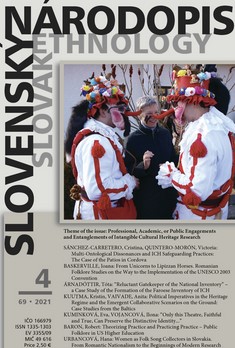Theorizing Practice and Practicing Practice – Public Folklore in US Higher Education
Theorizing Practice and Practicing Practice – Public Folklore in US Higher Education
Author(s): Robert BaronSubject(s): Cultural history, Museology & Heritage Studies, Customs / Folklore, Cultural Anthropology / Ethnology, Higher Education
Published by: Ústav etnológie a sociálnej antropológie Slovenskej akadémie vied
Keywords: public folklore; intangible cultural heritage; higher education; professionalization; public humanities;
Summary/Abstract: Higher education learning programs in folklore and ethnology should include training for the mastery of ICH and public folklore practices that are integrated with core curricula, grounded in theory and designed to build comprehensive professionalization of these disciplines. It should theorize practice and include engagement in actual projects with impacts beyond the classroom. A disjunction between theory and public practice which persisted for decades is now being addressed in graduate programs in ethnology and folklore, reaching towards what Bourdieu calls the “reconciling of theoretical and practical intentions”. The theories, issues and practices of public folklore currently and potentially taught in the United States suggest approaches that can be used for ethnology and ICH training. Topics can include cultural brokerage, intervention, heritage policies, cultural representation theories, dialogism, cultural sustainability, recontextualization, activism and advocacy, how community is defined, ethics and informed consent along with topics in heritage studies and the study of tourism. Practices taught can include multiple modes of presentation, media production, archiving, organizational and financial management, folklore in education and community engagement. Graduate training should include the intellectual history and contemporary dimensions of intervention in ongoing cultural practices transformative for communities and relationships of practitioners to their traditions. Folklore should be viewed as a practicing profession integrating comprehensive university training and reciprocal relationships between knowledge production in universities and the public sphere.
Journal: Slovenský národopis
- Issue Year: 69/2021
- Issue No: 4
- Page Range: 552-569
- Page Count: 18
- Language: English

